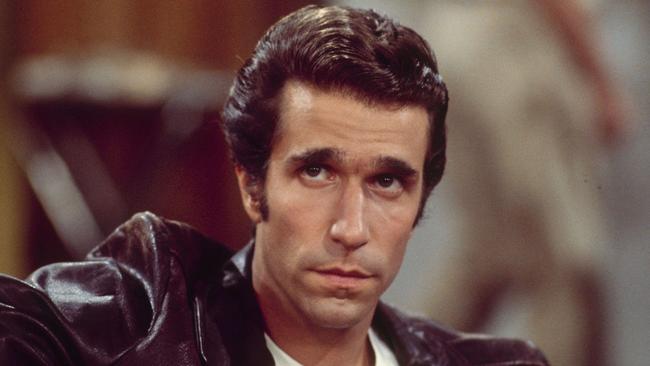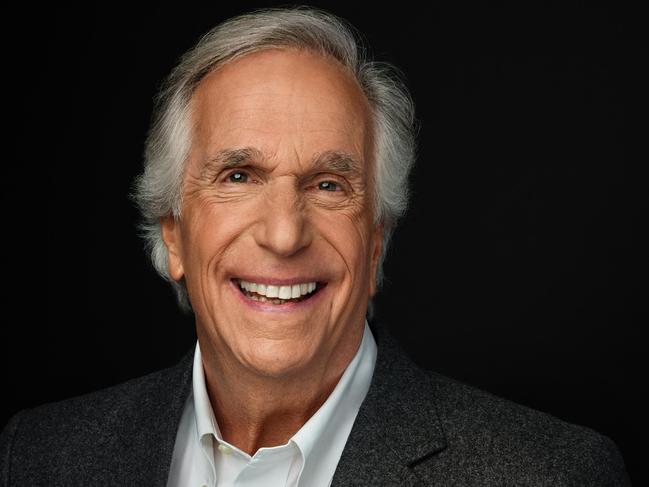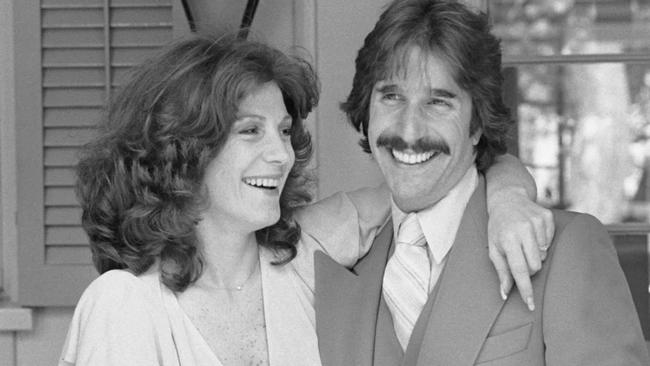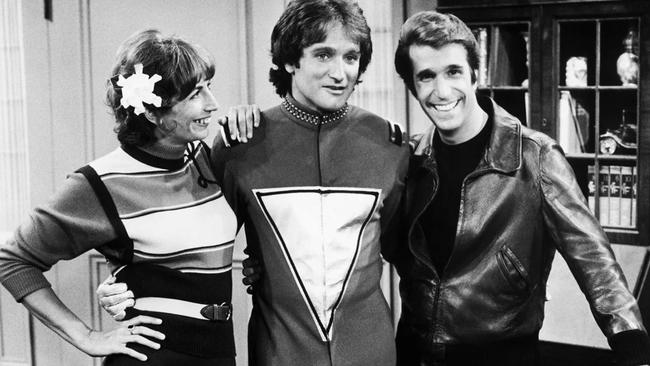‘Heyyyyyyyyyyyyy’: Winkler loved being Fonzie but his best role is as parent and grandparent
His parents called him a “dumb dog” because of undiagnosed dyslexia. He couldn’t read scripts and still can’t type. But nothing stopped Henry Winkler from finally “being Henry”.
Entertainment
Don't miss out on the headlines from Entertainment. Followed categories will be added to My News.
In Henry Winkler’s 78 years, he’s had a lot of Happy Days. But he’s also grown up with incredible pain borne from emotional abuse by those meant to love him and, subsequently, the feeling he was never good enough.
Today, the man made famous by a leather jacket and the Fonz’s signature ‘heyyyyyyyyyyyyy’ is now in the best place he’s been – and he’s coming to Australia to tell us all about it.
His new book, Being Henry, is the one thing in life the dyslexic actor was convinced he would never achieve.
Despite not being able to read a script or use a computer, the now author, director and producer looks back on more than 50 years as a Hollywood icon with pride as well as vulnerability – it’s not been an easy road.
“As the Fonz, I got to be everybody I wanted so badly to be and I wasn’t,” he says. “I’ve never been in control in my life.
“I love that I got to do what I did – but about nine years ago I was so discombobulated, I started seeing a talking doctor, a therapist, which has also been one of the great things I’ve done in my life ... when you know yourself ... when you start to just be who you are instead of who you think you should be … these are very happy days.”

He’s long been a campaigner for dyslexia – the undiagnosed condition that rocked his childhood, and had him labelled “dumb dog” by his strict German parents.
Throughout Being Henry, he details how he was treated by his parents, scars that he still carries today.
But the torments throughout the pages of his moving memoir are just the tip of the iceberg, the Happy Days star tells Insider this week.

“My wife was my secret editor at home and she said ‘you’ve got to pull back on your parents’ – so if you think that it’s raw about them now, you can only imagine.”
He maintains he still would have told that truth if his parents were still alive – but there’s a lot the public don’t know and much of it could have been a movie plot.
“There’s a story that I just remembered yesterday ... when I was about 14, we took a trip to Boston and I met a young lady there, maybe two years older,” he recalls.
“Now if you look up the word smitten, it says ‘Henry’. I was thunderstruck. I couldn’t breathe – and I’d write her a letter.
“Now because I’m so dyslexic, just imagine I see myself in a cartoon of balls of paper – ‘no, that’s not right, that’s not right’ – and I’m up to my neck in paper. I can’t spell, and I can’t cross out, so I have to start all over again. But I send her the letter. I wait for a response.
“No response. I write her another letter. Nothing. So then I’m about 21, and am looking for something in my father’s first drawer on his credenza, and there are the letters that she wrote that he did not give me – because he didn’t want me to be distracted.
“And all those years I thought, ‘Oh my God, my heart is broken’. That is the microcosm of what I lived through.

“And it’s heartbreaking, because children are going to feel that way anyway. They’re going to feel inadequate – not short enough, not tall enough, their skin, their bodies, whatever it is.
“There was no respect. I embarrassed my parents with a problem … but I wasn’t going to get it for the all the time in the universe.
“Children are on their own and, even if you don’t know what the problem is, our job is to make sure they soar to meet their destiny.”
Stacey has been Winkler’s loving wife and confidant of 47 years. They have three children they adore, six grandchildren they pick up from school and have for sleepovers, and who can forget Sadie, the five-year-old labradoodle, and Maisie, a four-year-old golden doodle, who come and say hello to Insider on zoom.
Winkler has achieved a lot. He’s won Emmys, Golden Globes and a Critics Choice Award. In recent times he is known for Arrested Development, Parks and Recreation, and Barry – but his greatest achievements stem from the loving home he and Stacey have built, as doting parents and grandparents.
So scarred was he by his own upbringing, he was determined to be different. And he is.
“When a child has a parent that understands them, that sees them for who they are, that might be one of the greatest gifts on the earth, bar none,” he explains.

He cannot use a computer. So while the idea for Being Henry came from the people he raised, he made it a reality by having a series of deep and meaningful conversations with co-author James Kaplan – some 70 hours worth.
“Max who is our youngest son, who is now 40, has said for years, ‘Dad, you’ve got to write a book ... and I thought I can’t,” he says.
“Then I met a James. We worked on it, we massaged it, we rewrote it – and now it is a real living, breathing book. I was just on the New York Times bestseller list, The LA Times bestseller list – I’m overwhelmed.”
While he would do Happy Days again “in a second”, he also spent much of his career since trying to prove what else he could do.
“When they say ‘what would you say to your younger self?’ I’d say, ‘you don’t have to worry that much, because it turns out okay’,” he laughs.
“When I got to play the Fonz ... I loved every millisecond. We’re all family. We are as family as we were 50 years ago.”
This upcoming trip will be his third time to Australia, and the past two have left quite an impact.
So much so that they make his book, which refers to his respect for Aboriginal teachings and his treasured ‘Australian pointing bone’ artefact, which he pulls out to show Insider from his LA home.
“I was there the first time in Alice Springs and I met cattle ranchers, we made bread in dirt, I got my hat. Since the beginning of my career, everybody in Australia has been so incredibly supportive,” he says.
And while his signature black hair has turned grey, Winkler is an older, wiser, better version of the man he always wanted to be.
“I would have to say, outside of my family and my grandchildren, the books are my greatest achievement, because never in my life did I think that my name would be on a cover of a book.”





